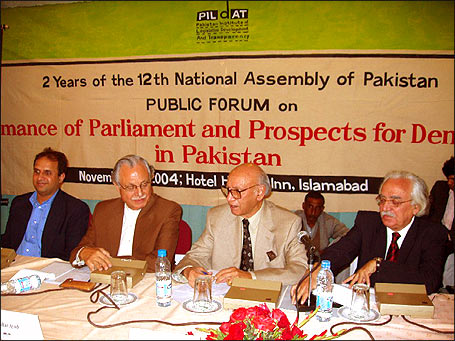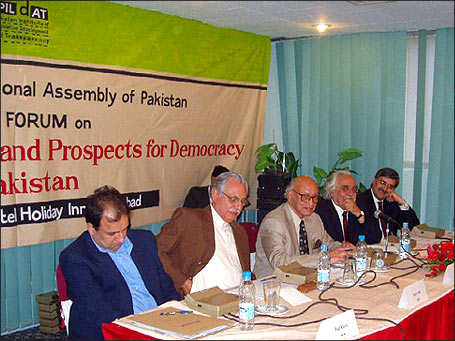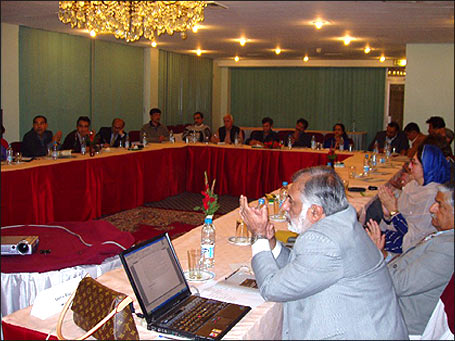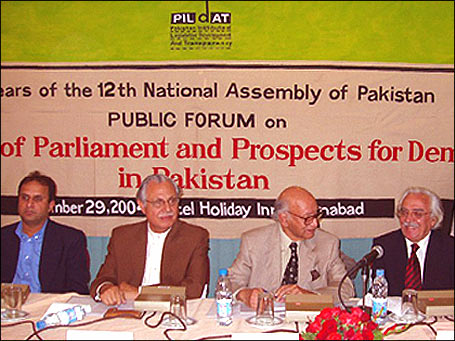|
|
| |
| EVENTS |
|
|
> First 2 Years and Performance of the National Assembly and Prospects of Democracy
Greater Public-Parliamentary Liaison Required |
|
|
| |
Islamabad: November 29: Performance of the National Assembly has been less than satisfactory due to the political environment in which the Assembly operates. It is required that better channels of liaison between public and parliament are created to bridge the gap between the public and its representatives. These views were expressed by speakers at the Public Forum organised by PILDAT on the topic of First 2 Years and Performance of the National Assembly and Prospects of Democracy on November 29, 2004 at Hotel Holiday Inn, Islamabad. The Speakers also believed that Pakistan as a country has a strong commitment to democracy. |
|
| |
The Forum was organised to review the performance of the first 2 years of the National Assembly. Speakers at the forum included Senator S. M. Zafar, Mr. Gohar Ayub, Former Speaker National Assembly; Mr. Qazi Muhammad Jameel, President Supreme Court Bar Association and Mr. Rauf Klasra, Parliamentary Reporter and Analyst. Prominent among the participants were leading Senators, MNAs, Former Speakers and Deputy Speakers; Analysts and the Media.
|
|
| |
Welcoming the participants and speakers at the forum, Mr. Ahmed Bilal Mehboob, Executive Director of PILDAT, said that the performance of the National Assembly should be viewed in the complete scenario of the country�s institution. PILDAT, as a research and training institution dedicated to strengthening democracy and democratic institutions, has made a modest effort to present an overview of the performance of the National Assembly through a booklet and the public forum is organised so as to make the debate relating to parliamentary performance relevant to public. In his presentation, he briefed the audience that National Assembly met for a total number of 65 days in the first year and 92 days in the second year for an average of 3-4 hours compared to the Lok Sabha in India that met for 90 days for 6 hours a day at average and the House of Commons, UK that met for 155 days for an average 8 working hours a day. The National Assembly passed 02 and 17 bills respectively in the first and second year compared to the average of 50 and 47 bills by Lok Sabha and House of Commons UK every year. The research support and publications which are necessary for providing information and support to legislators are close to non-existent in the National Assembly of Pakistan compared to the Indian and British Parliaments which devote a lot of time effort and energy in this regard, he added. |
|
| |
Mr. Rauf Klasra said that his analysis of the performance is from the press gallery. He believed that the major feature of performance has been the persistent struggle of the opposition against the military which is commendable. On the other hand, treasury benches have not only been unable to perform but feel frustrated and depressed as under the current scenario they are not consulted in major decisions such as the choice of Prime Minister or the Cabinet. Politicians, especially the opposition, seems to be learning the lessons today and the performance of politicians should be judged on their present conduct and they should not be continued to be reprimanded for their past performance. He said that it was unfortunate that politicians still offered themselves to be used by the military in the treasury benches for small term gains. He also felt that the openness with which the intelligence agencies have been permeating the political circles has actually resulted in an open and harsher criticism of them by the parliamentarians on the floor as their fear of the unknown is gone. Mr. Klasra also felt that the opposition has not been able to make optimum utilisation of the Question Hour which is the major instrument of holding the government accountable. |
|
| |
Mr. Qazi Mohammad Jameel, President Supreme Court Bar Association felt that the performance of the national assembly has been dismal. The invasion of civil society by the armed forces time and again has resulted in weakening of the political structures. The tardiness of the National Assembly mainly owes to transfer of power from absolute ruler to a comparative constitutional dispensation. Lack of a culture of tolerance, sense of duty and responsibility in representative of the public also is one reason for such a performance, he said. |
|
| |
Commenting on the topic, Mr. Gohar Ayub Khan said that it is necessary that all policy statements of the government should be made on the floor of the Parliament and the committee system needs to be strengthened to improve the performance of the assemblies. He strongly believed that the House discipline and effective running is in the hands of the Speaker while his sentiments were echoed by another former deputy speaker Mr. Wazir Jogezai. In order for democracy to be strengthened and Parliament to work effectively, it is necessary that an impartial and strong Election Commission is there in Pakistan whose decisions are not disputed, he believed. |
|
| |
Commenting on the performance of the Parliament, Senator Farhatullah Babar said that as parliamentarians, they had proposed a revision to the rules such as adjournment period of two days as working days during proceedings. He believed that a set calendar was necessary to schedule the working of Parliament. A vast number of questions and motions of members are killed in the chamber and we have proposed that the presiding officer should explain in writing why a question or a motion was disposed off without presenting it, he added. |
|
| |
|
|
| |
|
|
| |
|
|
| |

|
|
| |
|
|
| |

|
|
| |
|
|
| |

|
|
| |
|
|
| |

|
|
|
|
|
|
|
|
|